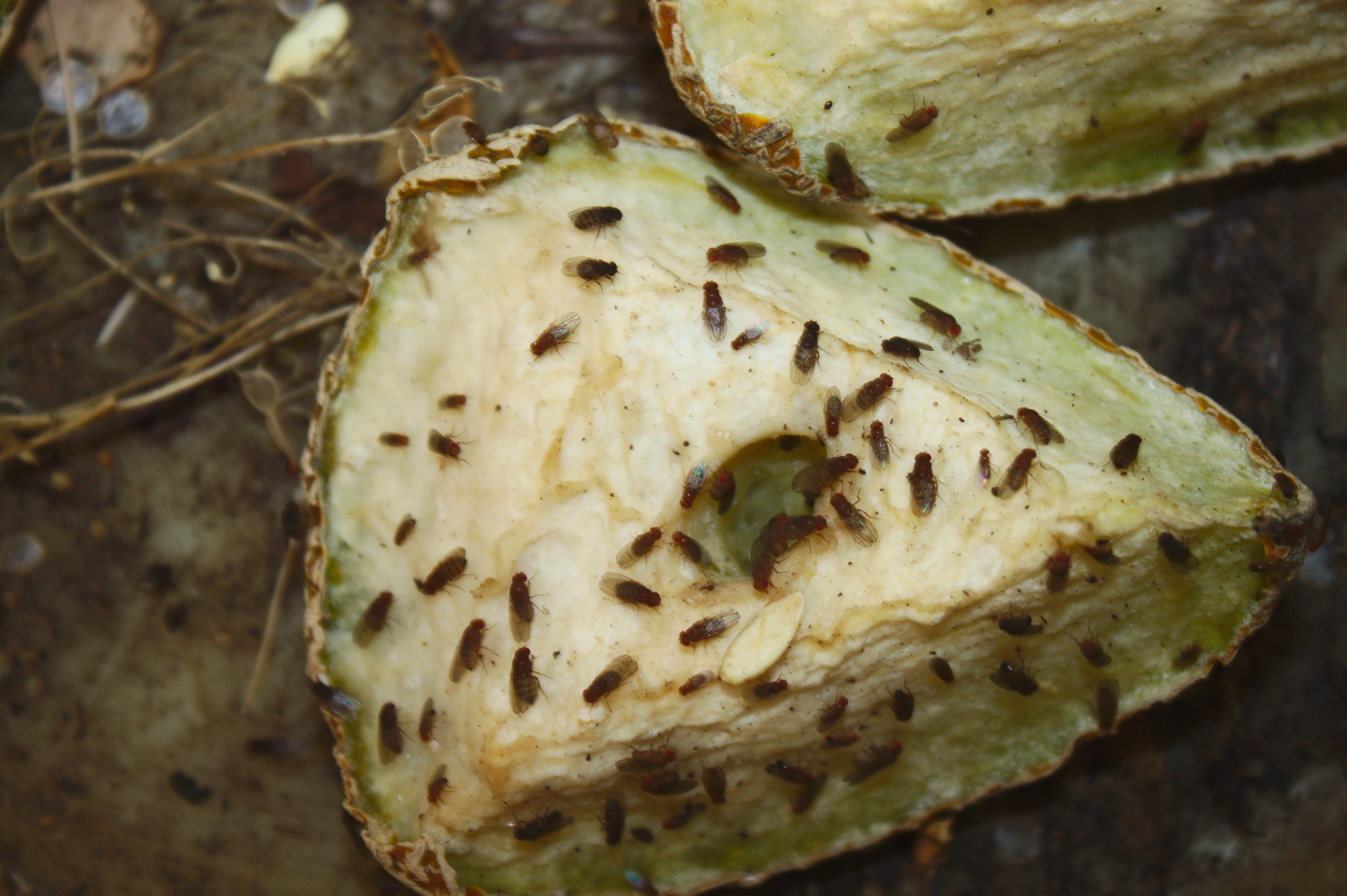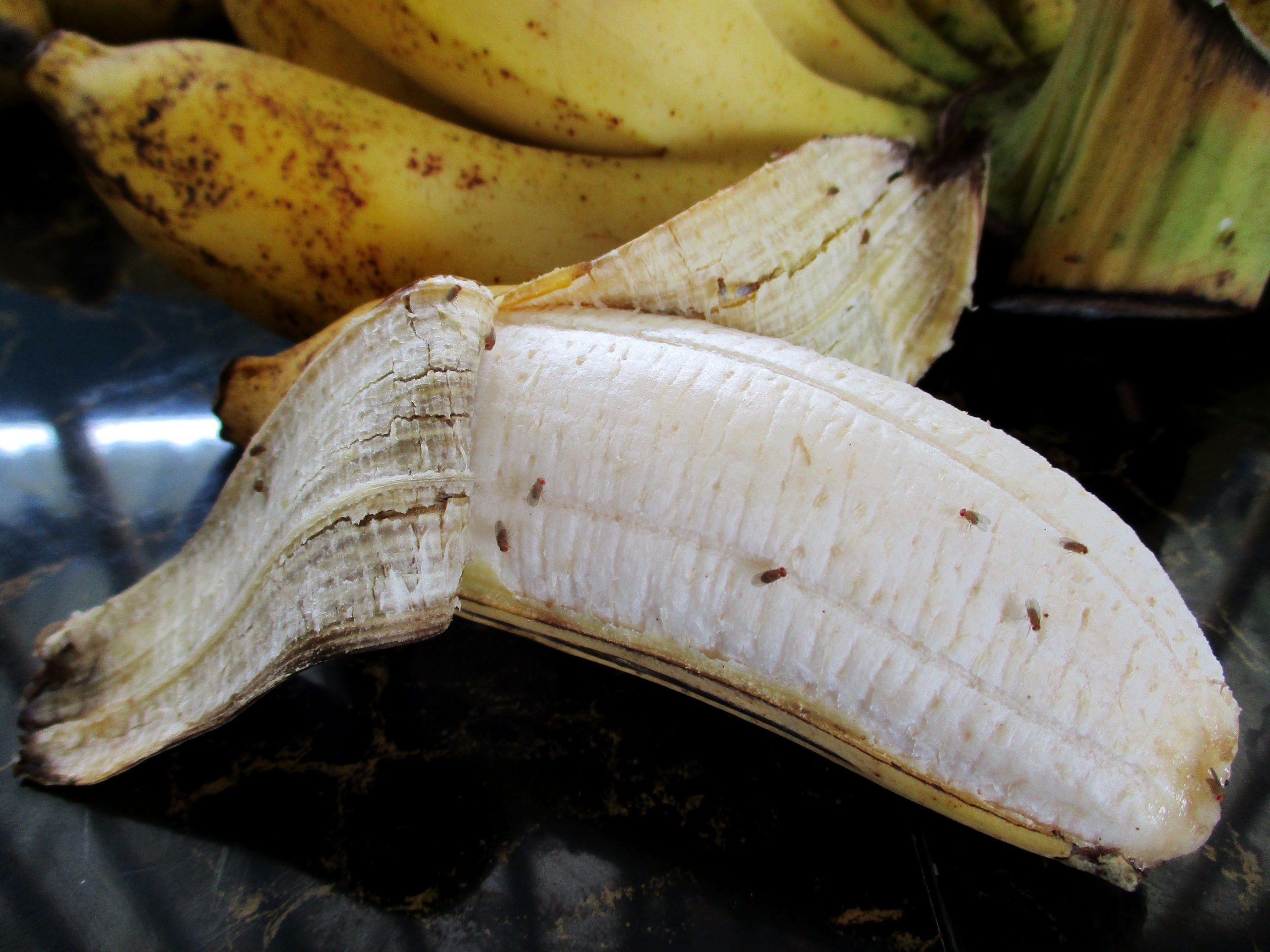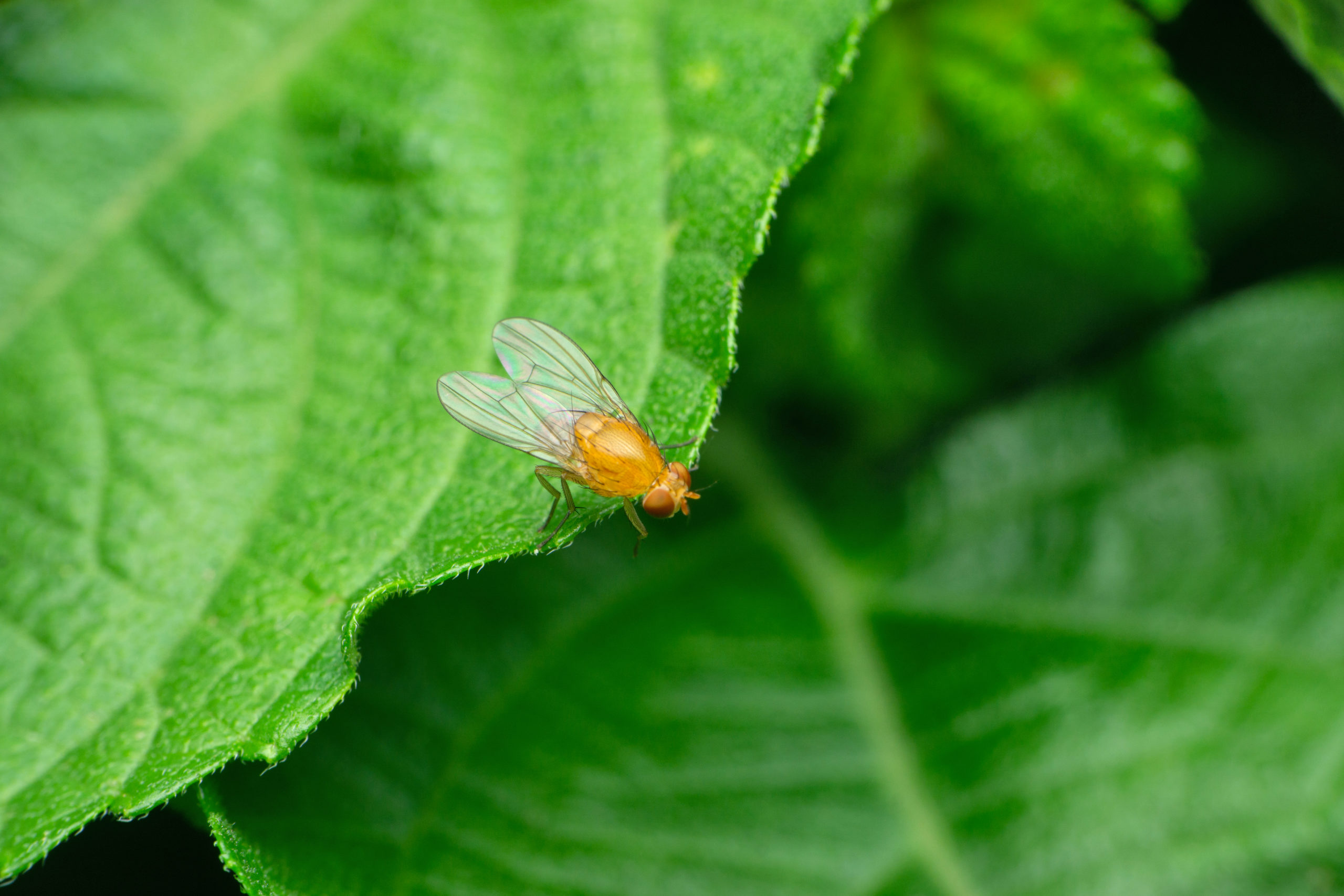Why Do Fruit Flies Love Our Kitchens?
Why Do Fruit Flies Love Our Kitchens?
Out of all the pests that seem to find their way into our homes despite our cleanliness, fruit flies have to be one of the most frustrating. They are harmless to us in that they don’t bite or sting, but they can transmit diseases and contaminate our food with their eggs. They are also so small yet numerous that it seems like they just won’t go away. With warmer weather comes fruit flies and many questions about the existence of these persistent pests, so let’s see if we can answer some of those questions right now.
What are Fruit Flies?

First of all, what even are these tiny bugs? We see them every year, yet they are usually forgotten as soon as they finally stop invading. Fruit flies are a type of fly and are from the order Diptera. They grow to be about 1/8 of an inch in length, which is much smaller than a common housefly. Fruit flies are brown, tan, or yellow in color, and have bright red eyes when you look close enough. Their lifespan only lasts about 40 to 50 days, which is comparatively short but feels like an eternity when they are living in your kitchen. And since their life cycle takes about a week to complete, they are flying adults for most of their lives.
Fruit flies also produce about 500 offspring every season, which is how they can quickly infest a small area. They can lay their eggs on all kinds of places that have moisture and a food source for both them and their future kin. These places include rotten fruit, vegetables, soil, and sink drains. There is a certain kind of fly called a drain fly that lives and eats off of drains, so it is easy to get them confused just based on their shared habits with fruit flies. But drain flies look like small fuzzy moths, so you would be able to discern the difference based on looks. Fruit flies aren’t a year-round pest, as they tend to exit stage right when the weather cools down for fall like the other pests. But if you have a lot of fruit laying out on the counter or multiple houseplants, it is a risk of having fruit flies camp out in your space.
How Do Fruit Flies Invade So Fast?

So now that we know what a fruit fly is, we should find out how they seem to go from 0 to 100 (literally) within a matter of days. Besides the fact that they lay 500 eggs at a time, fruit flies can also survive in fruit or vegetables being transported. If they lay eggs in fruit before it’s picked and brought to the store, fruit flies will be taken wherever the fruit travels, including into a potential home. This is why it’s important to inspect every fresh fruit and vegetable to make sure that there aren’t any hitchhiking pests.
If they weren’t already in the produce, fruit flies are so small and versatile that they can fit through just about any gap or tear in a window screen or doorway. They may also fly inside if the door is open for a long enough time while you’re transporting groceries inside or going to the backyard to enjoy the fresh air, so make sure to have doors open as minimally as possible. Fruit flies love warm environments, specifically in the kitchen, so even if your house is cooler than outdoors, they will still find the warmest spot with a food source if they gain access inside. But why our kitchens in particular? Kitchens are full of food which obviously fruit flies love, but there are also other factors at play. For example, fruit flies are attracted to the warmth and humidity of kitchens which is ideal for their reproduction cycle. There is also a trash can somewhere in the kitchen to serve as their home and food, and any kind of damp mop or sponge that isn’t properly cleaned and stored is also seen as fair game to these pests.
What Attracts Fruit Flies in the First Place?

This is typically the subsequent question that follows the previous one, as it may seem strange that fruit flies wouldn’t just stay outside where there is more vegetation. While they certainly infest crops outdoors, they prefer indoor spaces for a few key reasons. The best way to describe their preferred environment is dense, meaning that they seek a heavy feeling in the air surrounding an object. This is why humidity is perfect for fruit flies. Some of the main attractors for fruit flies include wetness, sludge, overripe produce, sugar, alcohol, and yeast. Yes, fruit flies like to be near alcohol, and not for the typical reasons. The yeast in the alcohol is very appealing to them, and even the tiniest bit leftover in a can or bottle can draw them in. This is why it’s important to rinse out every can and bottle before recycling, since both sugar and alcohol are main attractions for fruit flies and other pests.
This information brings up the issue of how fruit flies even find these specific foods and organic matter. The answer is simple: smell! Fruit flies especially enjoy rotting or sweet scents, which is why overripe fruit is often seen with quite a few flies on it. Unrefrigerated perishable food items are the big prizes for fruit flies because it’s a home and unlimited food rolled into one. Any kind of “counter” produce like watermelon, bananas, grapes, squash, and onions are common habitats for the lowly fruit fly. The carbon dioxide from fermentation is also a major draw, which explains the alcohol. They really only need fermentation to continue breeding as well. Any kind of moist decay or rot is also very appealing to fruit flies, which is why cleaning supplies like sponges and mops could be furniture fly homes if they are left out long enough.
How Can I Prevent Fruit Flies?

This is the million-dollar question with fruit flies. We know they exist and come in droves every year, but the question remains of if it’s possible to actually prevent them from ruining our produce and invading our kitchen in general. There are a few different tasks you can do that relate to cleaning and can prevent fruit flies while also providing you with a clean kitchen. One may seem obvious, but it’s to remove any soiled or overripe produce from your fridge and counters. Unless you plan on immediately using those blackened bananas to make banana bread (we recommend adding chocolate chips), toss them in a sealed garage can. Any kind of produce that is past its “Good By…” date should be gotten rid of before the fruit flies discover its presence.
In a similar line of thought, cleaning the sinks and drains is also a huge help in preventing fruit flies, as well as drain flies and gnats. There are specific drain-cleaning products on the market today, but you can also go the natural route with vinegar. Pouring boiling hot water has also shown to destroy any fly habitats that may be too deep in the drain for you to comfortably reach a gloved-hand in. Cleaning the drain is productive anyway since it will help with any mildew or unpleasant odors, so it’s a good idea even if the fruit flies are living there in the moment.
Also, don’t underestimate the power of a good screen in windows and sliding doors. Any kind of rip or gap in the screen is an open invitation for tiny flies to come inside. You can patch up smaller holes by cutting pieces of separate screen material and attaching it with adhesive. But if your screen is a little worse for wear, it might be better to just replace the whole screen. You can purchase the material at any major hardware store. When you have the window or door open on a nice day, make sure to keep the screen door closed when not in use to keep the home as pest-free as possible.
Finally, there are some DIY solutions that seem to be reliably effective against fruit flies if you find that you already have them. One is to simply try to trap them with a homemade vinegar trap, use a commercial fruit fly trap, or eliminate their food sources. For the vinegar trap, you will need a jar, fruit, water, and vinegar. Fill the jar with equal parts water and vinegar, and then add a piece of fruit. The fruit flies will be attracted to the fruit, but they will drown in the vinegar solution. Make sure to replace the materials after they have served their purpose for the first group. This may not be a permanent solution, but it can certainly count down on the number of invasive flies in the kitchen.
Of course, pest control services is always a valid option for the most effective pest prevention. Our treatments are all eco-friendly and EPA-approved, meaning they will solve the pest problems without using harmful chemicals in your home. Our experienced technicians all know how to provide you with a pest-free (and fly-free) home in the most efficient ways. Contact our team at any time for more information on how we can eradicate the flying pests that are keeping you from enjoying the warm weather and fruitful (literally) seasons.
Citations
Braidwood, J. (2021, October 8). Can houseplants attract fruit flies: Fixing the gnat problem. Braid & Wood. Available at https://braidandwood.com/can-houseplants-attract-fruit-flies/ (Accessed on June 16, 2022).
DeAngelis, Z. (n.d.). 8 foods, fruits, & scents fruit flies are attracted to. Pest Pointers. Available at (https://pestpointers.com/foods-fruits-scents-fruit-flies-are-attracted-to/ (Accessed on June 16, 2022).
Real Simple Editors. (2022, May 17). How to get rid of fruit flies and gnats in your house. Real Simple. Available at https://www.realsimple.com/food-recipes/shopping-storing/how-to-get-rid-fruit-flies (Accessed on June 16, 2022).
Watson, F.M. (2015, September 24). Tiny flies around fruit and vegetables are most likely fruit flies. UGA CAES Newswire. Available at https://newswire.caes.uga.edu/story/5596/fruit-flies.html (Accessed on June 16, 2022).
Request a Free Quote Today
(We do not share your data with anybody, and only use it for its intended purpose)


